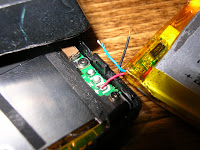
A friend of mine gave me his 1gb Sansa Clip mp3 player claiming it didn't work and there's no way to fix it, so if I repaired it, I could have it. When I got home I jumped online and did a quick google search for the symptoms this player was exhibiting. It won't turn on no matter what buttons you press in any combination for any amount of time. Also, when you plug it into a computer the 'connected' screen comes up, the battery appears to charge for a couple seconds, then it shows the battery fully charged. However, once you unplug it from the computer, nothing. After ruling out firmware I figured it was probably the battery, and after some more google'ing I found that other people had experienced the battery wires falling off.

So it was off to the work bench. I had nothing to loose, so out came the soldering iron the screw driver and some pliers. After some
prying with the screw driver I was able to get the thing appart and, low and behold, all three battery wires were disconnected from the board. Very carefully I stripped the wires with a
razor blade, make sure not to let the positive and negative touch once you have them stripped because
lithium polymer batteries are know to catch fire when shorted. Anyways, I was able to solder all the wires back to their homes

(red to + blue to N and black to -). I slid the power bar and the
screen lit up, so I put the buttons back and snapped the case back together and now I'm happily listening to the previous owners music as I type this.
Hope this helps someone out there.



